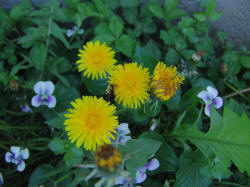You are currently browsing the category archive for the ‘Joints’ category.

Durian is an exotic, expensive, and seasonal fruit that has rich content of phytonutrients, antioxidant, protein, vitamins and minerals. Durian can give more spirit and energy to your days because it has high calories and carbohydrate (both are good source of energy). Main ingredients that contribute a lot to the benefits are Organosulfur Compounds and Tryptophan, but there other healthy components like dietary fiber and protein. Yet, durian does not have cholesterol. Many folk medications use durian’s leaves and roots to treat fever.
The Organosulfur has benefits as followed.
- To inhibit the formation of blood clots, thus prevent from heart attack and stroke.
- To control the inflammatory enzymes, thus also prevent from cardiovascular disease.
- To act as antioxidant, antimicrobial, antifungal, and antibacterial.
- To help you get good complexion, healthy hair, glowing skin, better brain function.
- To treat muscles soreness, enhance balance blood sugar, reduce stiffness and pain, and improve joint flexibility.
The tryptophan or L-Tryptophan has benefits as followed.
- To treat anxiety, bulimia, depression, insomnia, migraine, nightmares, compulsive disorder, and stress.
- To help you get better sleep, especially if you take some calcium with it.
- To help the treatment of Parkinson’s disease, obsessive compulsive disorder, premenstrual syndrome, suicidal related depression, and pain release.
Some people can not stand the smell of durian, while the rest love it so much. It tastes like heaven for those who love, even just by smelling the odor will make people curious. Countries in Asia are main producers of durians. They are Thailand, Malaysia, Indonesia, India, Vietnam, Philippine, and some others. There are hundreds variants of durians, but only some are heavily planted and sold. If you buy durians, you would want to choose ones that are big, fresh, fully ripen, and have solid stems. It is usually fully ripen in 2 to 4 days after falling from the tree, the best time to enjoy the flesh.
Health Benefits
- Raises serotonin levels…Creates an over-all sense of well being and aids in depression.
- It has a high amount of protein and amino acids (22 out of 24)…Good for muscle building and organ function.
- High in antioxidants…For anti-aging benefits including enhancing the appearance of your skin.
- It has the most complete nutritional profile of any fruit…Certain groups of people in Asia live on it, and nothing else, for up to 2 months at a time.
- It is power packed with nutrients, including essential fatty acids and organo-sulfur compounds…For increased energy, endurance, mental clarity, and cellular health.
- It enhances libido…It helps revitalize the desire for sexual intimacy
- Rich history of traditional uses…Anti-inflammatory, anti-parasitic, Thermogenic, calms fever, aids healing of swelling and skin diseases.
Drinking Durian For Beauty
According to David Wolf’s “Eating for Beauty”
“Durian contains high levels of tryptophan. This is an amino acid and a tryptamine (similar to serotonin, melatonin, and DMT). Researchers have discovered that tryptophan helps both anxious, depressed, repressed people, as well as insomniacs. Tryptophan works by raising serotonin levels in the brain. When serotonin levels increase, a euphoric feeling is felt as a free passage is cleared for nerve impulses to travel.
Durian is such a strong blood cleaner that eating a few durian a day can change the odor of urine (urine is filtered out of blood).
What gives durian its strongest beautifying characteristics is its high concentration of raw oleic fats (and vitamin E), sulphur compounds, and soft proteins. Durian actually contains one of the highest concentrations of protein of any fruit, making it an excellent muscle builder.” Organic sulfur
compounds among other properties in durian are very cleansing for the body.
Durian provides “more concentrated healthful energy in food form than any other product the world affords” – to keep the body vigorous and tireless; the mind alert with faculties undimmed; the spirit youthful.
Nutritive Value per 100 g
- Vitamin A: 20-30 I.U.
- Ascorbic Acid: 23.9-25.0 mg
- Vitamin E: “high”
- Calcium: 7.6-9.0 mg
- Phosphorus: 37.8-44.0 mg
- Potassium: 436 mg
- Thiamine: 0.24-0.352 mg
- Riboflavin: 0.20 mg
- Niacin0.6: 83-0.70 mg
- Iron: 0.73-1.0 mg
- Sugars(approx.) 12.0 g
- Protein: 2.5-2.8 g
- Fat: 5.33g
- Fiber: 3.8 g
- Total Carbohydrates: 30.4-34.1 g
- Calories: 144

